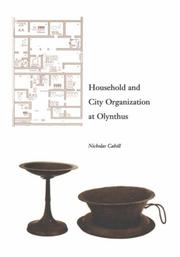| Listing 1 - 2 of 2 |
Sort by
|

ISBN: 0300084951 9780300084955 Year: 2002 Publisher: New Haven, Conn. : Yale University Press,
Abstract | Keywords | Export | Availability | Bookmark
 Loading...
Loading...Choose an application
- Reference Manager
- EndNote
- RefWorks (Direct export to RefWorks)
This book explains the relationships between house and city, between household and community, as they were worked out in practice at Olynthus in northern Greece. This polis was occupied for a short period of time, for eighty-four years at the most, and was then violently destroyed, leaving tens of thousands of artifacts on the final floors of its houses, and for the most part never reoccupied. A large part of the city was excavated between 1928 and 1938 by David M. Robinson, who published his findings in fourteen massive volumes. The archaeology of Olynthus offers a fuller and richer picture of Greek domestic and civic life than almost any other Greek site.
City planning --- Dwellings --- Olynthus (Extinct city) --- Buildings, structures, etc --- Urbanisme --- Habitations --- Olynthe (Ville ancienne) --- Buildings, structures, etc. --- Constructions --- City planning - Greece - Olynthus (Extinct city) --- Dwellings - Greece - Olynthus (Extinct city) --- Olynthus (Extinct city) - Buildings, structures, etc

ISBN: 1281731218 9786611731212 0300133006 9780300133004 9781281731210 9780300084955 0300084951 Year: 2002 Publisher: New Haven, Conn. Yale University Press
Abstract | Keywords | Export | Availability | Bookmark
 Loading...
Loading...Choose an application
- Reference Manager
- EndNote
- RefWorks (Direct export to RefWorks)
Olynthus, an ancient city in northern Greece, was preserved in an exceptionally complete state after its abrupt sacking by Phillip II of Macedon in 348 B.C., and excavations in the 1920's and 1930's uncovered more than a hundred houses and their contents. In this book Nicholas Cahill analyzes the results of the excavations to reconstruct the daily lives of the ancient Greeks, the organization of their public and domestic space, and the economic and social patterns in the city. Cahill compares the realities of daily life as revealed by the archaeological remains with theories of ideal social and household organization espoused by ancient Greek authors. Describing the enormous variety of domestic arrangements, he examines patterns and differences in the design of houses, in the occupations of owners, and in the articulations between household and urban economies, the value of land, and other aspects of ancient life throughout the city. He thus challenges the traditional view that the Greeks had one standard household model and approach to city planning. He shows how the Greeks reconciled conflicting demands of ideal and practice, for instance between egalitarianism and social inequality or between the normative roles of men and women and roles demanded by economic necessities. The book, which is extensively illustrated with plans and photographs, is supported by a Web site containing a database of the architecture and finds from the excavations linked to plans of the site.
City planning --- Dwellings --- Domiciles --- Homes --- Houses --- One-family houses --- Residences --- Residential buildings --- Single-family homes --- Buildings --- Architecture, Domestic --- House-raising parties --- Household ecology --- Housing --- Cities and towns --- Civic planning --- Land use, Urban --- Model cities --- Redevelopment, Urban --- Slum clearance --- Town planning --- Urban design --- Urban development --- Urban planning --- Land use --- Planning --- Art, Municipal --- Civic improvement --- Regional planning --- Urban policy --- Urban renewal --- Government policy --- Management --- Olynthus (Extinct city) --- Olynthios (Extinct city) --- Olynthos (Extinct city) --- Greece --- Buildings, structures, etc. --- Antiquities --- City planning -- Greece -- Olynthus (Extinct city). --- Dwellings -- Greece -- Olynthus (Extinct city). --- Olynthus (Extinct city) -- Buildings, structures, etc.
| Listing 1 - 2 of 2 |
Sort by
|

 Search
Search Feedback
Feedback About UniCat
About UniCat  Help
Help News
News